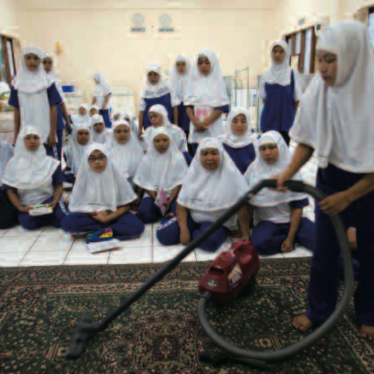(New York) - Saudi Arabia and Kuwait should jointly investigate the abuse and apparent trafficking of Nepalese domestic workers who agree to work in Kuwait but are instead made to work in Saudi Arabia against their will and abandoned there, Human Rights Watch said today.
A May 26, 2010 report in the Saudi daily Arab News, which was confirmed by a Nepalese diplomat in Riyadh interviewed by Human Rights Watch, said that Kuwaiti employers hire Nepalese domestic workers, then illegally transport them to Saudi Arabia against their will. The Kuwaiti employers leave the workers with Saudi families who are often related to the Kuwaitis and who usually pay a fee to them. The workers are then forced to work for the Saudi families.
"Saudi prosecutors have new legal tools to bring human traffickers to justice and should use them in this case," said Sarah Leah Whitson, Middle East director at Human Rights Watch. "And the reports about abuse and trafficking of these Nepalese workers urgently put Kuwait on notice that it needs to pass its own anti-trafficking law."
The Nepalese embassy official said it was difficult to hire domestic workers in Saudi Arabia because of a short supply. The Kuwaitis who transport the workers for a fee from Saudi employers apparently are exploiting that shortage. Saudi Arabia passed an anti-trafficking law in July 2009. The Kuwaiti parliament is considering a draft of an anti-trafficking law. Both countries have drafted, though not yet passed, legislation protecting domestic workers' labor rights.
More than two million foreign domestic workers are employed in Saudi Arabia and Kuwait and are at high risk of abuse and exploitation due to gaps in labor laws and restrictive immigration practices. The Arab News article said that 50,000 Nepalese domestic workers are in Saudi Arabia.
Arab News reported that Saudis employ Nepalese domestic workers who were recruited to work in Kuwait and then transported to Saudi Arabia without their consent in violation of Saudi labor laws.
Because of the difficulty of arranging for the illegally hired workers' departure from the kingdom when the Saudi families no longer wish to employ them, and to avoid paying fines for the illegal hiring, the families often abandon the workers at the Nepalese embassy, the paper reported.
An embassy official confirmed to Human Rights Watch on May 31 that the report in Arab News was accurate, adding that many of the Nepalese women arriving at the embassy appeared to have suffered abuse, including sexual abuse. The official mentioned that Saudi authorities typically facilitate the repatriation of these domestic workers, but do not investigate Saudi employers who illegally employ or abuse the workers. Article 33 of Saudi Arabia's 2005 labor law prohibits employing foreign workers, including domestic workers, who did not enter "the country legitimately and [are] authorized to work."
"After the maid is dropped off at the embassy here, they have to go to 'deportation,' [detention] where the authorities investigate if there are any criminal complaints against her," the Nepalese diplomat told Human Rights Watch. The authorities typically grant the domestic workers exit stamps, he said, but "they do not look into the Saudi family. Even when the girls have been raped and are pregnant."
Saudi Arabia's 2009 Anti-Trafficking Law is its first. Article 2 repeats the international definition of trafficking, which "prohibits the trafficking of any person by any means, including through coercion or threat, or of fraud, or deception, or abduction, exploitation of a position or influence, or abuse of power or a position of vulnerability, or by the giving or receiving of payments or benefits to achieve the consent of a person having control over another person, for the purpose of sexual attack, or forced labor or services, or begging, or slavery, or slavery-like practices, or servitude, or the removal of organs, or to conduct medical experiments."
The Saudi law calls for stiffer penalties "if the crime was committed across national borders." Kuwait's draft anti-trafficking law, proposed in July 2008, would punish trafficking across borders.
Jordan in 2008 became the first Arab country to extend protections in its labor law to domestic workers. Regulations specifying those protections issued in October 2009 prohibit an employer from taking a domestic worker abroad without her consent and without informing the worker's embassy. This prohibition, if enforced, can help safeguard against trafficking of domestic workers.
Kuwait, however, excludes domestic workers from its labor laws. A draft domestic worker law is before Kuwait's National Assembly, but it contains no provision requiring the consent of a domestic worker to accompany a Kuwaiti family abroad, nor does it require the trip to be registered with the worker's embassy.
Saudi Arabia, like Kuwait, continues to exclude domestic workers from its labor laws. The cabinet has not yet passed into law an Annex to the country's 2005 Labor Law, which the consultative Shura Council approved in 2009, outlining labor rights of domestic workers. The Annex contains no provisions to prevent trafficking of domestic workers across borders, such as requiring the worker's consent and embassy notification.
"Kuwait and Saudi Arabia should speedily update and pass measures protecting labor rights of domestic workers," Whitson said. "The updates should include measures to prevent employers taking domestic workers abroad against their will."
Human Rights Watch's investigation of abuses against domestic workers in Saudi Arabia, published in a July 2008 report, "As If I Am Not Human," revealed cases of forced labor, trafficking, slavery and slavery-like conditions, alongside the more widespread complaints of non-payment of wages and long working hours. In 2009 and 2010, Human Rights Watch investigated abuses against domestic workers in Kuwait and found, alongside violations similar to those found in Saudi Arabia, that Kuwait's government inadequately investigates and prosecutes allegations of abuse against domestic workers.
Human Rights Watch interviewed domestic workers in Kuwait whose employers had taken them to Saudi Arabia against their will, but who later returned with their employers.







